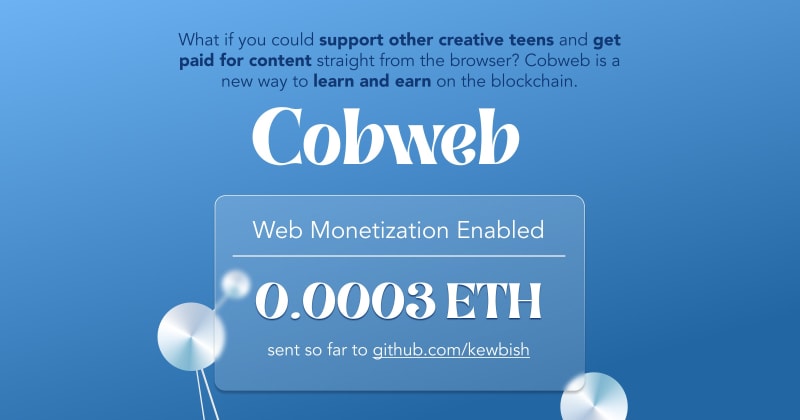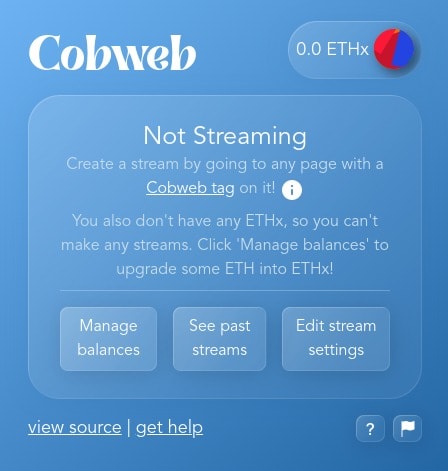dev-resources.site
for different kinds of informations.
Towards Web Monetization
It's been a couple years since Dev.to hosted the Grant for the Web hackathon, a month-long sprint to develop innovative projects with Web Monetization. Web Monetization is a proposed JavaScript API that allows browsers to create payment streams directly to websites, allowing for micropayments and unlocking exclusive content on a pay-per-use basis. It's still being incubated at the Web Incubator Community Group, but it's an active project and an exciting technology.
✨ I've recently built a project that aims to bring Web Monetization to the Ethereum blockchain, and would love any feedback on it! Scroll down to the bottom to learn more. ✨
The Current State of Web Monetization
Currently, the dominant player in the Web Monetization space is Coil, a subscription service that provides a Chrome extension to users. It connects to your cryptocurrency wallet - right now, Web Monetization works primarily on the Ripple blockchain. Whenever the Chrome extension detects a payment pointer, or a wallet address, it starts streaming micropayments. The page to which payments are being streamed can detect this and unlock exclusive paywalls.
It's straightforward to get set up: create a payment pointer with one of the supported wallets, and add a <meta> tag to your site. Bingo - any users with a Web Monetization extension that navigated to your pages would start streaming you small fractions of a cent as they spent time on your site.
Web Monetization has been touted as the future of micropayments and monetization on the Web. With enough work to boost adoption and reframe mindsets around current ad-based monetization models, I think it will be. But as it stands, the project seems to have stagnated and become more centralized around the key players above.
We need more providers
One of the more glaring issues seems to be adoption, specifically with WM providers. There are only a couple wallet providers, a handful of browser integrations, and only one payment provider, Coil, which is a for-profit company. Even with the technology and open source models these providers build with, I see a lot of centralization in the claims of decentralization.
Part of this is the feedback loop where companies don't see the benefits of investing in creating a payment processor for a niche area of monetization when there isn't widespread adoption and low profits to be made. In turn, because there's low adoption among existing companies, users perhaps don't see the point of creating a whole new account and subscribing to yet another service. Developers see that few people have accounts, and without a wallet at one of the few providers, might decide that the possible revenue would be too low to bother spending valuable time on it. And without high-profile companies integrating WM into their products, competing companies wouldn't bother to use WM, and so the cycle continues.
Consumer mental models must shift
I think it'll take a lot of time and promotion before WM starts growing to something that even a decent fraction of an app or content creator's userbase will readily have.
With the ads-based models that seem to be the standard on the web, users don't have to explicitly fork over any payment. The money creators make is not directly from you, but is still from you - your data, your analytics, and your preferences. The important thing, though, to note, is that the consumer never sees any of this. It's taken for granted that things are 'free' on the web, and that's a model we need to shift before WM becomes more dominant.
Conclusion
So many amazing projects came out of the Grant for the Web hackathon, including my project Revshare, and its sister project Revshare for GitHub. These projects let users configure payment pointers to split revenue coming into their sites, allowing users to each get a share of the Web Monetization proceeds.
But there's so much more innovation that can be done in the space, and the issues of centralization and consumer mindsets I've detailed above need to shift first. While this might seem daunting, the Web Monetization community remains active through a handful of forums and discussion boards. I'm hopeful and optimistic we can see more growth in the WM space in the future!
Side plug!
I've recently soft-launched Cobweb, a way for teens to learn and earn on the blockchain. It's built on the Web Monetization protocol with the Ethereum blockchain.
I hope Cobweb is a step towards making Web Monetization truly decentralized: to my knowledge, it's the only other monetization provider besides Coil. It's truly peer-to-peer, fully open source, and never takes a cut of any of your transactions. While it's targeted at teen creators for now, it can be used by anyone on Cobweb-monetized content. I'm excited to be contributing some innovation in the space!
I'd love any feedback on the project - comment down below if you have any thoughts!
Featured ones:

